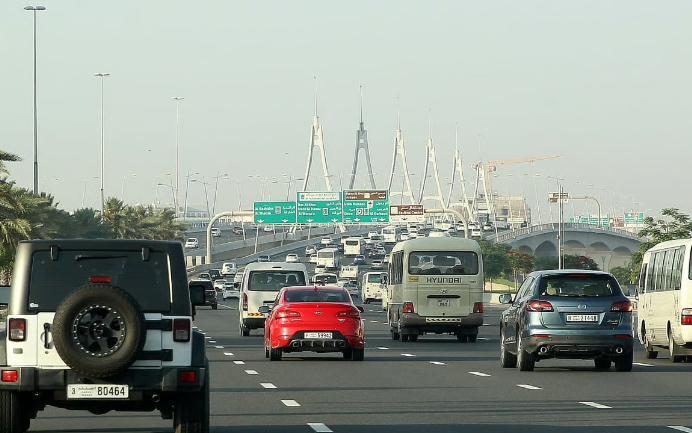Dubai’s economy is showing signs of cooling as Dubai inflation dropped to 2.3% in April 2025, down from previous months, largely due to falling fuel prices. This marks a notable shift in the emirate’s economic landscape, offering some relief to residents and businesses grappling with rising costs. However, housing remains a significant driver of inflation, keeping pressure on the cost of living. This article dives into the factors behind this change, what it means for residents, and what to expect moving forward.
What’s Driving the Drop in Dubai Inflation?
The decline in Dubai inflation to 2.3% in April is primarily tied to lower fuel prices. Global oil markets have stabilized, and Dubai, a key player in the energy sector, has seen petrol and diesel prices ease at the pump. According to the Dubai Statistics Center, fuel prices fell by approximately 4.2% compared to March, directly impacting transportation and logistics costs.
- Fuel Price Impact: Lower fuel costs reduce expenses for transport, delivery services, and even everyday commuting.
- Global Influence: A dip in global crude oil prices has trickled down to local markets, easing inflationary pressures.
- Consumer Benefits: Cheaper fuel means more disposable income for residents, potentially boosting retail and dining sectors.
This drop in fuel prices has provided a much-needed breather for Dubai’s residents, many of whom rely on personal vehicles in a city with sprawling infrastructure.

Housing Costs: The Persistent Inflation Driver
While fuel prices have offered relief, housing costs continue to push Dubai inflation upward. The real estate market in Dubai remains red-hot, with rental and property prices climbing steadily. Data from the Dubai Statistics Center shows that housing costs, including rent and utilities, rose by 3.8% year-on-year, making it the largest contributor to inflation.
Why Are Housing Costs So High?
Several factors are fueling the rise in housing costs:

- Population Growth: Dubai’s population is growing, driven by an influx of expatriates and professionals attracted by job opportunities and tax-free income.
- Limited Supply: Despite new developments, the supply of affordable housing struggles to keep pace with demand.
- Luxury Market Boom: High-end properties and premium rentals are in high demand, especially in areas like Downtown Dubai and Dubai Marina.
For many residents, especially those on fixed incomes, rising rents are squeezing budgets. A family renting a two-bedroom apartment in a mid-range area like Jumeirah Village Circle now faces annual rents upwards of AED 80,000, a 5% increase from last year.
Sector-by-Sector Breakdown of Inflation Trends

Beyond fuel and housing, other sectors are also influencing Dubai inflation. Here’s a closer look at key areas:
- Food and Beverages: Food prices have remained relatively stable, with a modest 1.5% increase. Imported goods, which Dubai relies heavily on, have seen steady costs due to improved global supply chains.
- Transportation: Thanks to lower fuel prices, transportation costs dropped by 2.1%, offering relief to commuters and businesses reliant on logistics.
- Utilities: Electricity and water costs rose slightly by 1.8%, driven by seasonal demand as temperatures climb.
- Education and Healthcare: These sectors saw moderate increases of 2.4% and 2.7%, respectively, reflecting Dubai’s focus on maintaining high standards in these areas.
This mixed picture shows that while some costs are easing, others continue to challenge residents’ wallets.
How Does This Affect Dubai Residents?
The drop in Dubai inflation to 2.3% is good news for many, but the impact varies across different groups:
- Commuters: Lower fuel prices mean cheaper daily commutes, especially for those driving to work or school.
- Renters: Rising housing costs are hitting renters hardest, particularly in popular areas like Dubai Marina or Business Bay.
- Business Owners: Reduced transportation costs could lower operating expenses for small businesses, potentially leading to competitive pricing.
- Investors: The real estate market’s strength continues to attract investors, but affordability concerns may slow demand for mid-range properties.
For the average resident, the easing of inflation is a step in the right direction, but high housing costs remain a hurdle. A single professional earning AED 10,000 per month might still spend 40-50% of their income on rent alone.
What’s Next for Dubai’s Economy?
Looking ahead, economists are cautiously optimistic about Dubai inflation. The emirate’s economy is diverse, with tourism, trade, and real estate as key pillars. However, several factors will shape inflation trends in the coming months:
- Global Oil Prices: If oil prices remain stable or drop further, fuel-related costs could continue to ease.
- Real Estate Policies: Government initiatives to boost affordable housing could help temper rising rents.
- Tourism and Events: Dubai’s busy event calendar, including expos and festivals, could drive demand for goods and services, potentially nudging prices upward.
The Dubai government is also taking steps to manage inflation. Recent measures include subsidies on essential goods and investments in public transport to reduce reliance on personal vehicles. These efforts aim to balance economic growth with affordability for residents.
Comparing Dubai to Other GCC Cities
Dubai’s inflation rate of 2.3% is relatively low compared to other Gulf Cooperation Council (GCC) cities. For instance:
- Abu Dhabi: Inflation in the UAE’s capital stood at 2.5%, driven by similar housing pressures.
- Riyadh: Saudi Arabia’s capital reported a slightly higher 2.7% inflation rate, with food costs playing a bigger role.
- Doha: Qatar’s inflation was around 2.4%, with energy costs still a factor despite global price drops.
Dubai’s ability to keep inflation lower than its neighbors reflects its diversified economy and proactive government policies.
Tips for Residents to Manage Rising Costs
While Dubai inflation is easing, residents can take steps to stretch their budgets:
- Shop Smart: Look for discounts at supermarkets and consider bulk-buying non-perishable items.
- Explore Housing Options: Areas like Al Barsha or International City offer more affordable rents compared to premium locations.
- Use Public Transport: Dubai’s metro and bus systems are cost-effective alternatives to driving.
- Monitor Utility Usage: Simple habits like turning off lights and using energy-efficient appliances can lower bills.
By making small adjustments, residents can better navigate the economic landscape.
The Bigger Picture: Dubai’s Economic Resilience

Dubai’s economy has shown remarkable resilience despite global challenges like fluctuating oil prices and supply chain disruptions. The drop in Dubai inflation to 2.3% signals a positive trend, but the persistent rise in housing costs highlights the need for targeted policies to ensure affordability. As Dubai continues to attract global talent and investment, balancing growth with cost-of-living concerns will be key.
The emirate’s ability to adapt—whether through infrastructure investments or economic diversification—positions it well for the future. For now, residents can enjoy the slight relief brought by lower fuel prices while keeping an eye on housing trends.
Stay Informed on Dubai’s Economy
Keeping up with economic trends like Dubai inflation can help residents and businesses make informed decisions. Whether you’re a renter, a business owner, or an investor, understanding these shifts is crucial. Check back for more updates on Dubai’s economy and how it impacts your daily life.
Read More: New Mental Healthcare Clinic Opens in Dubai’s DHCC Facility












